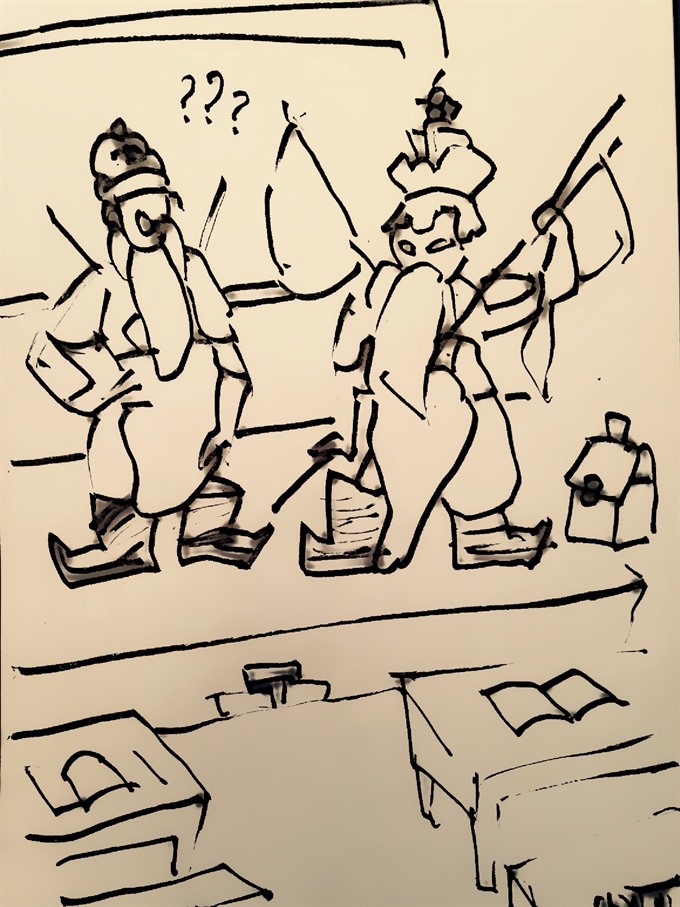 Talk Around Town
Talk Around Town

Some Vietnamese artists have suggested adding traditional theatre arts into the curriculum of Việt Nam’s general education from primary school to high school as a compulsory subject after seeing public, particularly young people, losing interest in the theatrical art forms.
 |
| Illustration by Đàm Minh Chí |
By Bích Hường
Some Vietnamese artists have suggested adding traditional theatre arts into the curriculum of Việt Nam’s general education from primary school to high school as a compulsory subject after seeing public, particularly young people, losing interest in the theatrical art forms.
The early teaching and learning about traditional theatre arts is expected to help inspire and nurture students’ understanding and love for the arts. It is hoped when they grow up, they can enjoy the traditional theatrical arts that rooted centuries ago in the country.
Việt Nam’s traditional performing arts are very diverse, varying from region to region. Some of the most widely known genres of singing include ca trù, cải lương, chầu văn, chèo, quan họ or tuồng.
Stage director Đào Quang from the northern province of Nam Định said that teaching traditional theatrical arts in schools was a necessary move to preserve and promote them in this modern life.
In 2001, the Performing Arts Department under Ministry of Culture, Sports and Tourism and the Centre for Research, Conservation and Development of National Culture launched a project introducing theatrical arts to schools nationwide.
Until 2010, the project reached 32 provinces and cities nationwide. There was one or two schools in each locality and normally, about 20-30 students per school joined the project activities such as learning from artisans and performing some pieces.
It takes at least four or five years for a starter to master and perform skillfully a piece of traditional theatrical art. So, three months for a training course at school is surely not enough for students to properly know about the art.
Stage director Quang said the project was meaningful but generated modest impacts. He called on drastic moves including making traditional theatrical arts a compulsory subject at school.
However, painter and culture researcher Nguyễn Đức Bình expressed concerns about the suggestion, saying that once they have to learn traditional theatre arts at schools, kids would be afraid of the art.
He emphasised that more importantly, to give kids chances to access, to “be exposed” to truly traditional theatrical arts and then, they would find the beauty, the attraction of the arts.
“Those who have ability and passion for the arts will pursue them. Others without endowed ability will become wise audience,” Bình said.
“When it comes to traditional arts, you can not force someone to love it,” he said, adding that when people saw it and found it interesting, they would like it and possibly voluntarily “fall in love” with it.
Nguyễn Hồng Hạnh, a mother of first grader in Hà Nội said she did not think it was a good idea to add traditional theatrical arts into compulsory curriculum.
“It sounds unreasonable to add many things in the school curriculum just because someone thinks they are necessary or good for the kids or something else,” she said.
Tuồng, chèo or quan họ singing should be introduced to extra curriculum or optional school activities, Hạnh said.
"Objectively speaking, people nowadays are far away from traditional arts not because they did not like them but because they had fewer chances to access them," Hạnh said.
“As a mother, I really want my children get to know about national traditional cultural values. It’ s great if they can sing folk songs, play folk games, see traditional performing arts,” Hạnh said, adding that today, children are exposed too much to imported cultural products like films, music and especially pinned too much to TV, mobile phones and technological devices.
I totally agree with researcher Nguyễn Đức Bình that we should not and could not force some one to love arts in general and traditional theatrical arts in particular.
My teacher told me that a characteristic of aesthetic education is voluntariness and must not be any imposition.
It’s good to help young students learn about traditional values including traditional theatrical arts because it surely helps nurture their love for the arts but why at school?
Out-of-school environment could offer lessons well or even better. I myself think it will be a great experience if I see a tuồng/chèo performance, finding it interesting and then, get to know about it without any school pressures of scores or deadline.
In order to make traditional theatrical arts alive in modern life and have their audience, a key measure is to offer works that meet specific tastes of target audiences. — VNS




